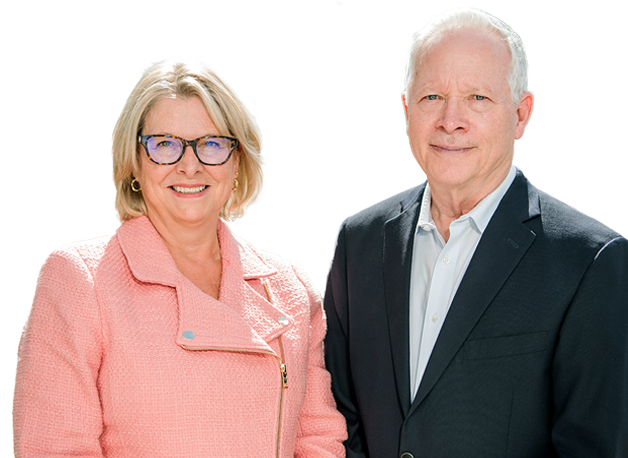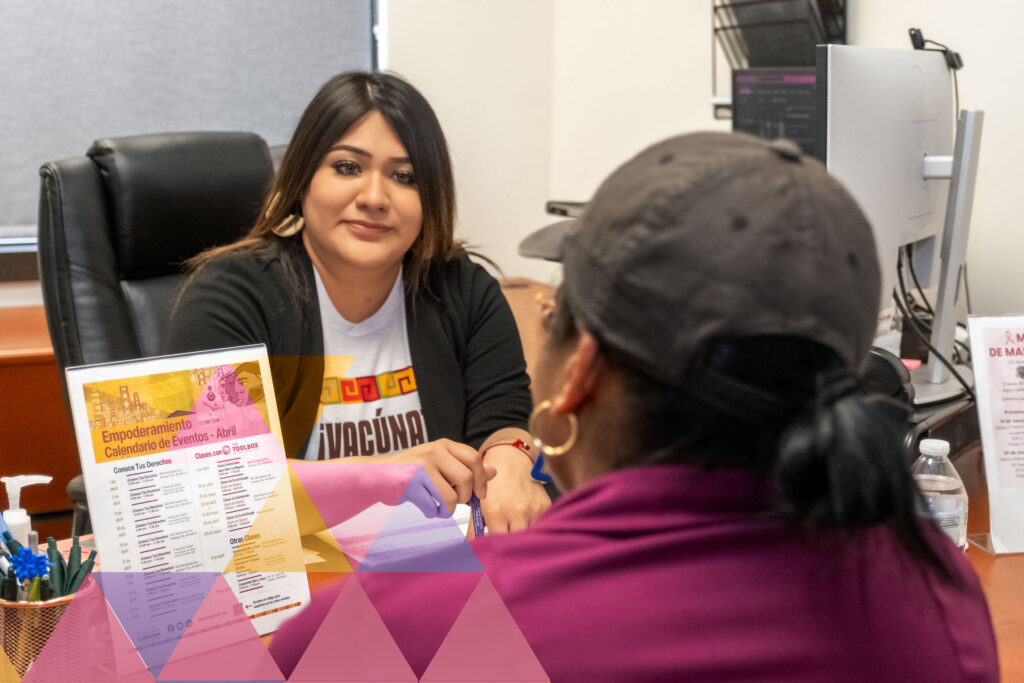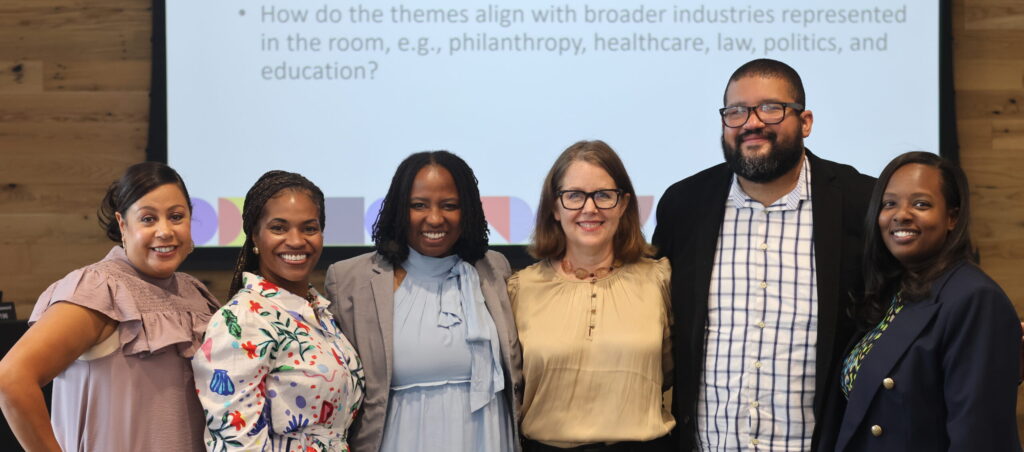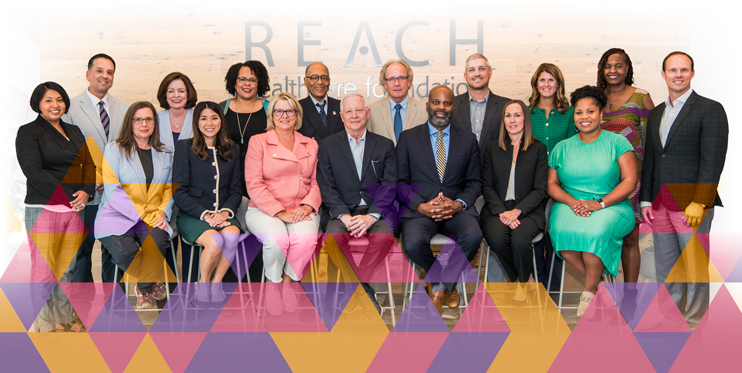

The REACH Healthcare Foundation is proud to release its 2024 Annual Report, a celebration of the philanthropic investments and key partnerships supported by the foundation to create a more equitable, just and accessible health ecosystem across our six-county service area.
While there is much to celebrate, we are also humbled by the task ahead for the nonprofit health and human services sector. We certainly expected significant changes in the direction of health policy following the November elections, but we now know that the scope and scale of those deviations will have profound implications for public health, the work of our organization, and that of our grantee partners for decades to come.
Despite tremendous uncertainty, the leadership of REACH holds firm to the foundation’s guiding principles and remains steadfast in our mission and purpose. We have always asserted that healthcare is a human right, and our funding priorities and activities will continue to reflect that core value.
In 2024, the foundation’s role in advancing public policy was on full display, despite the mid-year departure of our long-time and beloved Director of Public Policy, Pattie Mansur. REACH partnered closely with Kansas Governor Laura Kelly, the Alliance for a Healthy Kansas, hundreds of advocates, the business community, and our philanthropy colleagues on a proposal to expand the state’s Medicaid program, KanCare, and we saw progress. In hearings in both the Kansas House and Senate, proponent testimony dwarfed that of opponents. Sadly, despite those efforts and tremendous public support for expansion, key leaders in the Kansas legislature once again denied a floor vote on this life-saving legislation.
In Missouri, we were successful in bringing together legislators and health service providers experiencing tremendous challenges with enrolling their patients and clients in MO HealthNet, the state’s Medicaid program, and in collecting millions of dollars in back payments from the state. Challenges remain, but significant strides were made to improve timeliness of payments and raise awareness with legislative leaders and state program administrators, resulting in process and technology improvements.
REACH also made clear our support for Missouri Amendment 3, the Right to Reproductive Freedom Initiative, which passed a statewide referendum by a clear majority but remains under attack. We continue to monitor the Missouri General Assembly’s efforts to reverse the people’s will and will respond accordingly to ensure that a patient’s healthcare decisions remain between them and their provider, free of government intervention.
REACH’s past and current investments to build the capacity of our advocacy partners in Kansas and Missouri, support research on the impacts of expansion and related proposals to reform Medicaid, and build coalitions to educate the public are paying dividends in the face of federal funding cuts currently under consideration in the U.S. Congress. Our experience tells us that policy work is a long-game, and we are encouraged that advocates are better prepared than ever to tell the stories of thousands of Kansans and Missourians who deserve affordable, quality health care access.
Public policy advocacy takes a toll on leaders and their organizations. Recognizing this, REACH and our health funder colleagues supported special funding in 2024 to the Alliance for a Healthy Kansas to provide respite, development, and training to allow advocates the space and resources needed to restore and sustain their efforts after nearly 15 years of advocacy on the Medicaid issue. Combined with a second year of REACH Wellness Grants to nearly 27 nonprofits partners across our service area, we sought to reinforce the importance of self-care and rest.
Early in the year, the Board of Directors did a deep dive on the state of rural health with a day-long tour and visits with our funded partners in Cass County, Missouri. Topics of discovery included mental health services delivery, the face of DEI in rural settings, school and community-based partnerships, the many roles public health departments play in rural America, and post-pandemic challenges that continue to be faced by service providers. Rural community investment remains a high priority for the foundation.
Readers will note that this year’s report places a special focus on the foundation’s steadfast commitment to advance a more diverse, equitable, inclusive, and accessible health ecosystem in our service area. The Centering Black Voices initiative, launched in 2019 under the leadership of our outstanding VP of Programs, Carla Gibson, has continued to evolve the foundation’s overall grantmaking practices and capitalize on tools and strategies the foundation has found to be effective since our inception.
Our approach of engaging highly competent, culturally aligned consultants to assist our nonprofit partners has roots in prior initiatives launched by the foundation—Medical Home, Cultural Competency, and Communities Concerned for Immigrants and Refugees. In 2024, REACH reemphasized that strategy by making technical assistance and expertise more accessible to Black leaders of grassroots organizations doing innovative, but often overlooked, work to advance health and healthcare access in our community. Both consultants and technical assistance recipients alike have found deep value in this effort, and we encourage other funders to consider this form of resource investment.
REACH ended the year with two special convening sessions, planned well ahead of election season but proving incredibly timely in hindsight. In November, we brought together nonprofit leaders and our philanthropic colleagues to understand the anti-DEI litigation and legislation landscape and potential legal considerations for the nonprofit sector. In December, we were thrilled to host a session with national experts from Kaiser Health News, David Rousseau and Julie Rovner, who provided a timely and candid recap of the health policy changes most likely to be pursued over the next four years of the new administration.
This report includes only a few of the major highlights of an eventful and productive year. We also want to acknowledge the everyday contributions made to advance the mission and vision of REACH by our fellow Board members, our small but talented and courageous staff, and our tenacious community partners and key stakeholders who put the public’s health above all else. We encourage you to review the list of all 80 organizations supported by REACH in 2024, visit their websites, and think about your own role in advancing their meaningful work. Lastly, in these tumultuous times, we encourage all our stakeholders to take care of themselves and their neighbors, as the work ahead requires each of us to draw on our strength and resolve to sustain and expand the health of our region.
REACH uses a community investment framework that serves as a roadmap for grantmaking priorities. The framework is centered on three outcome areas that support bolstering equitable health outcomes. The Strengthen the Safety Net area represents the most significant portion of the foundation’s grant awards, totaling $2,210,500, with $1,700,000 of that total dedicated to unrestricted funding for our core operating partners and $282,000 for capacity building grants. Bridge the Coverage Divide includes longstanding investments in care connectors and enrollment assisters, and grants in support of civic engagement, including voter registration and education. As part of the Close the Health Equity Gap outcome investment, the foundation is entering its third year of the Centering Black Voices initiative, while continuing to invest in support for immigrant and rural health.




Core operating grants represent a significant investment in supporting a high-quality, effective safety-net health care system—a commitment that the REACH Foundation has upheld for over a decade. These unrestricted grants empower recipient organizations to address critical needs and further their missions without specific spending limitations.
In the 2022-2026 Community Investment Framework, REACH refined its goals for funding Core Operating Partners, placing greater emphasis on diversity and expanding the cohort to include new community organizations. Additionally, in 2022, the foundation transitioned to structuring these grants as two-year awards, a strategic move that provides multi-year funding and underscores its long-term commitment to supporting the vital work of these organizations.

Written in collaboration with REACH’s long-term Centering Black Voices Consultant, Kathryn Evans, “The Broken Triangle: A Framework for Reparative Philanthropic Relationships” examines the systemic barriers that Black-led and Black-serving organizations encounter within traditional philanthropic structures. This exploration was prompted by a 2018 portfolio review that revealed these organizations were often excluded from grantmaking opportunities. In response, REACH launched the Centering Black Voices (CBV) pilot project, which gathered firsthand insights from Black nonprofit leaders in Kansas and Missouri to advise the foundation on its investments in the Black community. These leaders highlighted significant challenges, including limited access to funding and strained relationships with funders and consultants. The findings from this initiative led REACH to reevaluate its grantmaking practices, with the goal of repairing, rebuilding and strengthening its connections with the Black community.
At the heart of the report is the concept of the “broken triangle,” which symbolizes the often-fractured relationships among funders, grantees, and consultants. To address these issues, REACH has implemented several strategic changes, including transitioning to longer-term, flexible funding, deepening trust-based philanthropy practices, reducing administrative burdens, and redefining consultants as integral, culturally aligned partners through its Core Consultants program.
At the heart of the report is the concept of the “broken triangle,” which symbolizes the often-fractured relationships among funders, grantees, and consultants. To address these issues, REACH has implemented several strategic changes, including transitioning to longer-term, flexible funding, adopting trust-based philanthropy practices, reducing administrative burdens, and redefining consultants as integral, culturally aligned partners through its Core Consultants program.
“The Core Consultants model represents the healthiest and most beneficial version of a relationship between the funder, the consultant, and the grantee. This relationship pattern is so common, but too often, the power dynamics are out of balance. REACH has done a great job recognizing that each side of the ‘triangle’ brings something of value to the relationship and strengthens the work.”

The REACH Healthcare Foundation partnered with the University of Kansas Medical Center’s Center for African American Health to launch the “Building Mainstream Champions” (BMC) educational series as part of its continued commitment to advancing racial equity through reparative practices and as a springboard to future work in expanding efforts to all, not just the Black community. Designed to provide essential historical context, the series explores how systemic racism—including slavery, segregation, and resistance to diversity and inclusion—has shaped the health disparities that persist within Black communities today.
By grounding participants in this history, the series sought to foster racial healing, rebuild trust, and inspire transformative change in the places where people live and work. Through this educational experience, community leaders and advocates are empowered to implement informed strategies to reduce health disparities and promote more equitable approaches to healthcare and community well-being.
By grounding participants in this history, the series sought to foster racial healing, rebuild trust, and inspire transformative change in the places where people live and work. Through this educational experience, community leaders and advocates are empowered to implement informed strategies to reduce health disparities and promote more equitable approaches to healthcare and community well-being.

In 2024, REACH partnered with the Urban Institute to develop the “Black Kansans in Review: Health Report.” This report offers an in-depth examination of health outcomes and social determinants affecting Black residents across Kansas. The analysis revealed ongoing disparities in life expectancy, rates of chronic diseases, and access to healthcare when compared to white Kansans. These health gaps are deeply rooted in systemic issues, including income inequality, lack of access to quality education and housing, and a shortage of culturally competent healthcare providers.
This report serves as a valuable resource for policymakers, healthcare leaders, and community organizations committed to advancing health equity. By identifying specific areas of concern and addressing root causes, the findings can help inform targeted and effective interventions. It also underscores the necessity for inclusive, community-driven strategies that dismantle systemic barriers and promote equitable access to care.
The REACH Foundation is governed by a 17-member board of directors who reside within the foundation’s six-county service area. REACH Board members bring diverse demographic and life experiences, passion for the communities where they live and work, and governance, civic, nonprofit and business expertise.
